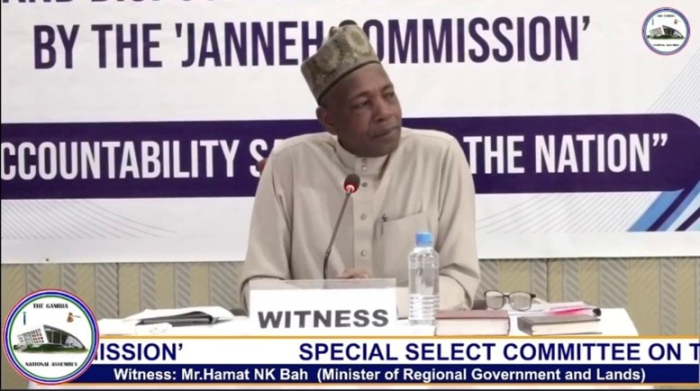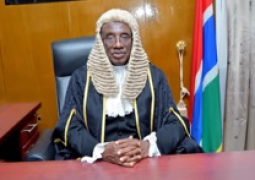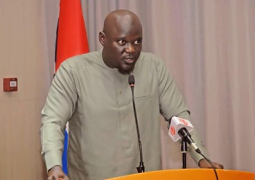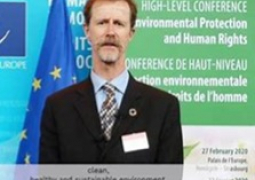
“It is very important that I come to this committee to shed light on some of the misconception and misinformation regarding this whole issue of Jammeh,” he said, adding that journalism had played a role in fuelling public confusion. He specifically referenced the publication of the Republican article, which he claimed contained “significant inaccuracies” about the matter.
Bah told the committee that when Parliament saw the public uproar, it naturally intervened. “Parliament represents the people,” he said. “When there is an issue of national concern, it is always important that parliament comes in, in order to clarify and get the facts before the people.” He added that although he welcomed the committee’s work, he had expected it to wrap up within one month.
The minister began his narrative from what he called the genesis. “When the Janneh Commission completed its report, it was forwarded to the Cabinet Secretary to produce the White Paper, determining which recommendations were accepted and which were not. Cabinet then established a task force subcommittee to examine Jammeh-related assets and advise on what should be done with them.
According to Bah, the government acted in good faith, forming a technical committee of permanent secretaries and support staff to evaluate the assets. “Their report was then reviewed by the cabinet task force, which in turn submitted recommendations to Cabinet for final approval.”
He said some assets were deemed unsuitable for sale and kept for the usage of the Government of The Gambia. Others, Cabinet decided, should be disposed of. A receiver was appointed to evaluate property, and those approved for disposal proceeded through valuation and public tender.
Sales were done set by set, Bah explained “three, four sets of sales”. Buyers paid into the national treasury and titles were processed afterwards. The subcommittee consistently reported to Cabinet on its work.
Asked whether the technical committee or the cabinet subcommittee still sits today, Bah replied firmly: “None.”
The technical committee, he said, was dissolved immediately after submitting its report. The subcommittee reported back to Cabinet based on that technical submission.
He could not recall specific dates but agreed to look at documents if needed.
Counsel pressed Bah to specify what categories of assets from the Janneh Commission fell under the subcommittee’s mandate.
“Various assets,” he said. “Houses, you know, different assets.”
But he insisted they did not handle vehicles or cattle, noting that the cattle issue was done before the report was even published.
Bah reiterated that his committee was strictly advisory. “We were not taking decisions that were not approved by the Cabinet,” he stressed. “Their work relied primarily on the White Paper, though they occasionally consulted the Janneh Commission’s nine volumes when there was still a need.”
However, he admitted he could not recall whether such consultation was ever actually necessary.
Meetings were initially frequent, but later a little bit distant, and slow. Minutes, he confirmed, existed and should be in the custody of the Attorney General’s Chambers.
He expressed disappointment to hear that the Assembly had not received them.
The committee examined two reports (April 2020 and October 2020), asking Bah to confirm their nature. After reviewing the documents, he agreed the first was the technical committee’s report, and the second belonged to the ministerial task force.
He disagreed with calling the latter a final report, noting that the government had not completed its work: “The committee has not finished selling assets of Jammeh; not finished yet.”
Bah, however, could not provide figures or a percentage of assets sold.
Counsel then focused on a key point during the Janneh Commission’s inquiry, certain lands in the Tourism Development Area had their freezing orders lifted.
Bah offered a direct explanation. “When we came to power,” he said, “there were a lot of inquiries from people who wanted to invest in this country. Unfortunately, because of this embargo, investors were thrown away.”
He explained that the Gambia Tourism Board (GTB) needed access to the lands to allocate them to investors, and the government feared losing opportunities. The Attorney General, he said, was therefore directed to seek court approval to lift the restriction. Bah confirmed a letter was issued to GTB listing the lands available for allocation.
Asked whether he had consulted lawyers beforehand, Bah stated “I don’t need a lawyer. I’ve been a lawmaker. I’ve been sitting where they’re sitting.”
Bah confirmed that during their work, the subcommittee discovered more Jammeh assets that had not been included in the Janneh Commission’s findings.
“Yes I can say this loud and clear,” he confirmed, although he could not provide numbers or lists. He advised the committee to seek those from the Attorney General.
Counsel asked whether there were challenges implementing the task force findings?
“I cannot recall,” Bah repeated several times, though he admitted challenges were likely.
Bah confirmed that lands previously allocated in the Tourism Development Area were returned to the Gambia Tourism Board through a letter from the Attorney General’s Chambers.
However, he could not distinguish whether all or only some were returned.




